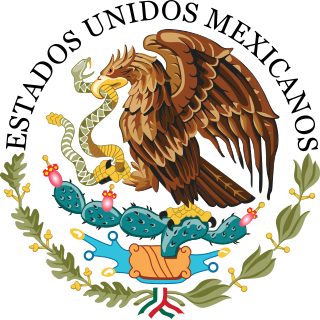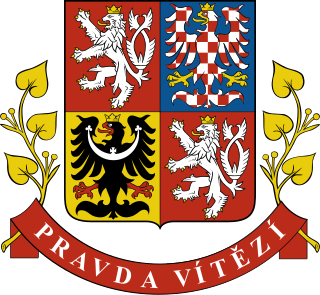
The politics of Mexico function within the framework of a federal presidential representative democratic republic whose government is based on a multi-party congressional system, where the President of Mexico is both head of state and head of government. The federal government represents the United Mexican States. It is divided into three branches: executive, legislative, and judicial, established by the Political Constitution of the United Mexican States, published in 1917. The constituent states of the federation must also have a republican government based on a congressional system established by their respective constitutions.

The president of the Czech Republic, constitutionally defined as the President of the Republic, is the head of state of the Czech Republic and the commander-in-chief of the Armed Forces of the Czech Republic.

The Chamber of Deputies is the lower house of the Congress of the Union, the bicameral parliament of Mexico. The other chamber is the Senate. The structure and responsibilities of both chambers of Congress are defined in Articles 50 to 70 of the Constitution.

Elections in Mexico are held for officials at federal, state, and municipal levels. At the federal level, the nation's head of state, the president, is directly elected with the popular vote by all Mexican citizens for a six-year non-renewable term. All members of the bicameral federal legislature, the Congress of the Union, are also elected by all Mexican citizens. At the state level, each state has an elective governor and unicameral congress. At the municipal level, the municipal presidents are also elected by their citizens. Since 2016, a constitutional amendment has designed Mexico City to be a fully autonomous entity on par with the states. Its city mayor, city congress, and borough mayors are elected by their citizens in a similar fashion to those states.
Romania elects on a national level a head of state – the president – and a legislature. The president is elected for a five-year term by the people. The Romanian Parliament has two chambers. The Chamber of Deputies has currently 330 members, elected for a four-year term by party-list proportional representation on closed lists. The Senate has currently 136 members, elected for a four-year term by party-list proportional representation on closed lists.

National-level elections in Djibouti are held for the President and the unicameral National Assembly.

Elections in Rwanda are manipulated in various ways, which include banning opposition parties, arresting or assassinating critics, and electoral fraud. According to its constitution, Rwanda is a multi-party democracy with a presidential system. In practice, it functions as a one-party state ruled by the Rwandan Patriotic Front and its leader Paul Kagame. The President and majority of members of the Chamber of Deputies are directly elected, whilst the Senate is indirectly elected and partly appointed.

Elections in Zambia take place within the framework of a multi-party democracy and a presidential system. The President and National Assembly are simultaneously elected for five-year terms.

The Plurinational Legislative Assembly is the national legislature of Bolivia, placed in La Paz, the country's seat of government.

General elections were held in Mexico on Sunday, 2 July 2006. Voters went to the polls to elect a new President of the Republic to serve a six-year term, replacing then President Vicente Fox ; 500 members of the Chamber of Deputies to serve for three-year terms; and 128 members of the Senate to serve for six-year terms.

The National Assembly is Zambia's unicameral legislative body. Between 1972 and 1990, Zambia was a one-party state with the United National Independence Party (UNIP) as the sole legal party.

The LXII Legislature of the Congress of the Union, the 62nd session of the Congress of Mexico, met from September 1, 2012, to August 31, 2015. It consisted of Senators and Deputies in their respective chambers. All members of both the lower and upper houses of the Congress were elected in the elections of July 2012.

Legislative elections were held in Mexico on 18 August 1991, alongside gubernatorial elections in six states. The Institutional Revolutionary Party (PRI) won 320 of the 500 seats in the Chamber of Deputies and 31 of the 32 seats up for election in the Senate. Voter turnout was 61% in the Chamber election and 62% in the Senate election.

General elections were held in Mexico on Sunday, 1 July 2012. Voters went to the polls to elect a new President of the Republic to serve a six-year term, replacing Felipe Calderón, 500 members of the Chamber of Deputies and 128 members of the Mexican Senate.

General elections were held in Paraguay on 21 April 2013. They resulted in a victory for the Colorado Party, which had ruled the country for 60 years before losing power in 2008. The presidential elections were won by the Colorado Party's Horacio Cartes, who defeated Efraín Alegre of the Paraguay Alegre alliance. The Colorado Party also won the most seats in the Senate and Chamber of Deputies.

General elections were held in Dominican Republic on 15 May 2016 to elect a president, vice-president and the Congress, as well as 20 deputies to the Central American Parliament, municipal councils, mayors and vice mayors. On 15 May 2015 Roberto Rosario, president of the Central Electoral Board, said that there would be about 4,300 seats up for election in the "most complex elections in history".

The Central Electoral Commission of Armenia (CEC) organizes elections and referendums in Armenia. The Commission oversees and regulates the electoral process, counts and publicizes results, among other duties. Before the formation of the Republic of Armenia in 1991, the Central Electoral Committee activities were carried out in accordance with Soviet Armenian laws set by the Election of People's Deputies. Electoral reforms were adopted in August 2011 concerning the organizing and conducting of presidential and regional elections in Armenia, three levels of electoral committees were established.

Parliamentary elections were held in Haiti on 9 August 2015, with a second round initially planned for 25 October. Two-thirds of the Senate and all members of the Chamber of Deputies were up for election. International observers reported that early rounds of voting have experienced significant fraud, including people voting more than once due to failure of indelible ink, vote buying due to lack of secrecy, poor training of election workers, poor tracking of political parties, and other problems. This has resulted in the nullification of some results and rescheduling of re-runs. The second round of the parliamentary elections that had been scheduled for October 2015 was postponed to October 2016, along with the first round for a third of the Senate and the first round of a new presidential election.

General elections were held in Paraguay on 22 April 2018. President Horacio Cartes and Vice-President Juan Afara of the Colorado Party were not eligible for re-election. The presidential elections were won by the Colorado Party's Mario Abdo Benítez, who defeated Efraín Alegre of the GANAR alliance. The Colorado Party also won the most seats in the Senate and Chamber of Deputies. The new President and Vice-President took office on 15 August 2018 and left office in August 2023.

The Independents is a political party in the Czech Republic.



















